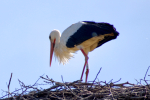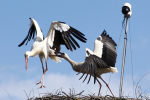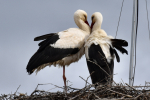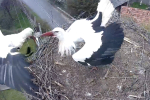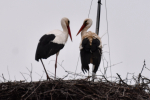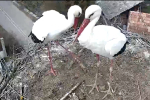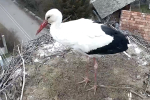On Wednesday, May 21, at 9:55 a.m., loud bill-clattering could be heard coming from the stork nest in Vlaha. We could observe that there were two storks in the nest, one of which was wearing a white ring. We immediately headed to the neighbouring garden, where the light conditions of the morning allowed us to take better quality photos. We observed that the nest was occupied by a stork wearing ring number 8031. Two other storks were circling around the nest. It sometimes allowed one of them to land, but chased the other away.
News
A stork that was ringed in this village in 2022 returned to Vlaha for Easter. The stork wearing ring number 7844 arrived in the village with a companion on April 20, Easter Sunday, and attempted to land on the nest at around 4:54 p.m., but was not given a friendly welcome. It was chased away by the lone stork defending the nest.
The storks in Vlaha have really given us a challenge this year in terms of interpreting what is happening in the nest. This year, things are not happening in Vlaha at all as they have in previous years.
But let's see what the video camera mounted above the nest has captured so far.
As we reported, the first stork arrived on March 21. It tidied up the nest, flew out to search for food, but spent most of the following days in the nest.
Since Wednesday, March 26, there are two inhabitants of the nest in Vlaha yet again. According to the timelapse, a second stork appeared in the nest at 4:52 p.m. and ended up staying there for the night. The stork couple started mating several times during the day, but they didn't manage to finish the act when they were photographed. However, the attempts were sufficient for us to see which of them is the male.
We will wait a few more days for identification, as the rainy, gloomy weather did not provide the lighting conditions necessary to take good photos.
On Monday, March 24, we were able to enjoy the sight of two storks in the nest in Vlaha for just over an hour as they celebrated finding each other by mating. The stork's joy also lasted just over an hour: the bird that arrived at 1:03 p.m. flew away at 2:11 p.m., and the one that arrived first continues to sit alone in the nest.
On Friday, March 21, at 12:34 p.m., the first stork of the season landed in the nest in Vlaha. It signaled its arrival by bill-clattering, then began to adjust the branches around the edge of the nest. It did not fly off for more than four hours. It was resting from the fatigue of its long migration. Since then, it has only left the nest for short intervals to find food. It is awaiting its mate. For the time being, we are not ready to conclude whether it is Miska, Leske, or perhaps a new resident that has arrived at the nest.
On Monday 8 July, the first baby stork left the nest at Vlaha. It left the nest at 9:08, with its siblings eagerly watching. The bravest of the chicks returned at 9:56, missing the feeding at 9:34. From 13:53 to 15:02 he was absent from the nest yet again, missing a feeding, but certainly getting some food from outside sources.
The two boys from Vlaha, who were hit by a jet of droppings from a stork chick that was flushed from the nest during a stork ringing on Friday morning, are lucky. The children, along with around 30 of their peers from the kindergarten and school in Magyarfenes, came to the site to pet the baby stork, learn about the life of storks and see how the ringing process is carried out. They all had a good time.
In a display of death-defying bravery, the snail that climbed onto the back of Leske, who was sitting on the nest in Vlaha, at dawn on Monday 6 May. The snail crawled out from under Leske's wing at dawn and at 5.57 a.m. set off on a voyage of discovery on the feathers of the laying female. The adventure lasted a good 15 minutes. It managed to hang on even when Leske got up at 6:10 to count his chicks.
As predicted, on 4 May, the first two storklings hatched in the nests at Vlaha. The babies cracked their shells 34 days after the first eggs were laid. Both the first eggs were laid and the first chicks were born on a symbolic day. Roman Catholics and Protestants celebrated Easter when the first egg was laid, while the first baby storks were born on Orthodox Easter Saturday. Let us take these coincidences as a good sign and hope that the other eggs will hatch and that all the baby storks will be raised.
It seems that the storks of Vlaha have stopped at five eggs again this year and will not attempt to lay any more. Since the 31st of March, new eggs have been laid every two days in the stork nests. If the sixth had come, it should have been released today, April 10th. This did not happen, and Leske and Miska are following the tried and tested model again this year.
At dawn on the 31st of March, Leske laid her first egg of the year in the nest at Vlaha. The egg arrived on Easter Sunday, just a few minutes after midnight, a mere two hours before the clock was set to change from EET to EEST. The timer shows Leske (the female) showing it to Miska (the male) at 00:13. This is the eighth year that we have been monitoring the nest in Magyarfenes via webcam, and we have never had an egg as early as March in this period. The earliest was on April 1st 2018 (then also Easter), the second earliest on April 3rd last year and the latest on April 13th 2022.
On Monday morning, the 18th of March, the first stork appeared in the nest at Vlaha. According to the timelapse, it landed on the nest at 7:47 and left at 7:55. He did not celebrate his arrival by bill-clattering. He did straighten a twig or two on the nest, but we suspect he was just passing through.
Since Tuesday 25th of July, one of the storklings ceased to return to the nest. Miska and Leske continue to bring food to the nest a couple of times a day, but Monday evening, 24th of July, was the last time three young storks competed for the food brought by the elders. Then the next morning the young fledged, and only two have since joined in on the family meals.
Two months after hatching, the storks of Vlaha took flight for the first time. From the pictures of the time lapse, the bravest one left the nest at 10:20 on Sunday 9 July and returned an hour later to make sure he didn't miss the 11:38 feeding. The attempt was successful, and was repeated several times the next day. On the third day, 11 July, at 19:00, two more chicks were missing from the nest. The one left alone looked on enviously at his companions. On Wednesday 12 July, just after 10am, the nest was completely empty for the first time.
A stork that grew up and was ringed in a nest in the Vlaha nest last year was photographed in Bacău County. The stork, wearing the ring 7844, was captured by observer Constantin Chiriloaie on 21 June on the banks of the Bistrița River, about eight kilometres from the centre of Bacău city, near the village of Ruși-Ciutea. The stork was part of a group that also included two storks ringed in Hungary. The observer informed the Milvus Group, which forwarded the photo and information sent to the operators of the Clujbird.ro website.
Thank you for the news!
On June 20, Tuesday, the stork chicks growing in the nest at Vlaha were ringed. Many children accompanied by their parents and grandparents gathered at the event. They were also given the opportunity to pet the stork chick brought down to be ringed under the nest. During the ringing, Leske and Miska kept an eye on the nest on the roof of neighboring houses.
After they reached the age of one month, in the last few days the parents left the stork chicks alone in the nest at Vlaha several times. On the evening of June 13, we saw the little ones for the first time without parental supervision. Then when we tried to check if this was the first occasion, we noticed that it had also happened earlier on the same day and the previous day. So far, the parents have only been away from the nest for periods of a few minutes.
One of the baby storks died in the nest in Vlaha on Friday 19 May. At its last feeding on Wednesday evening, everything seemed to be fine, but by early Friday morning it had stopped moving. Throughout the day, hay had been put on its head several times. Saturday morning at 6:15 Leske threw the carcass out of the nest.
The last time we recorded a similar case was in 2017.
The first two storks hatched in the nest of Vlaha on Tuesday morning, the 9th of May. This time the parents clutched for 36 days after the first egg was laid. Of course, the calendar is relative, as Leske laid the eggs shortly before midnight. If she had only laid them a couple of hours later, they would have been counted on a different day. Nor do we know exactly when during the night the eggshell was broken. In fact, at 6.16 a.m. the heads were already moving. So it is possible that the 34 days were only delayed by a few hours this time.
A strange incident was observed on 30 April between 14:11 and 14:13 near the stork nest in Vlaha. Leske was clutching eggs when four storks circling high above approached the nest. Two of them descended, one of them even landed on the nest and, together with Leske, scared away the other descender by loud bill clattering. It was then confirmed that Miska was the stork that had landed on the nest.

